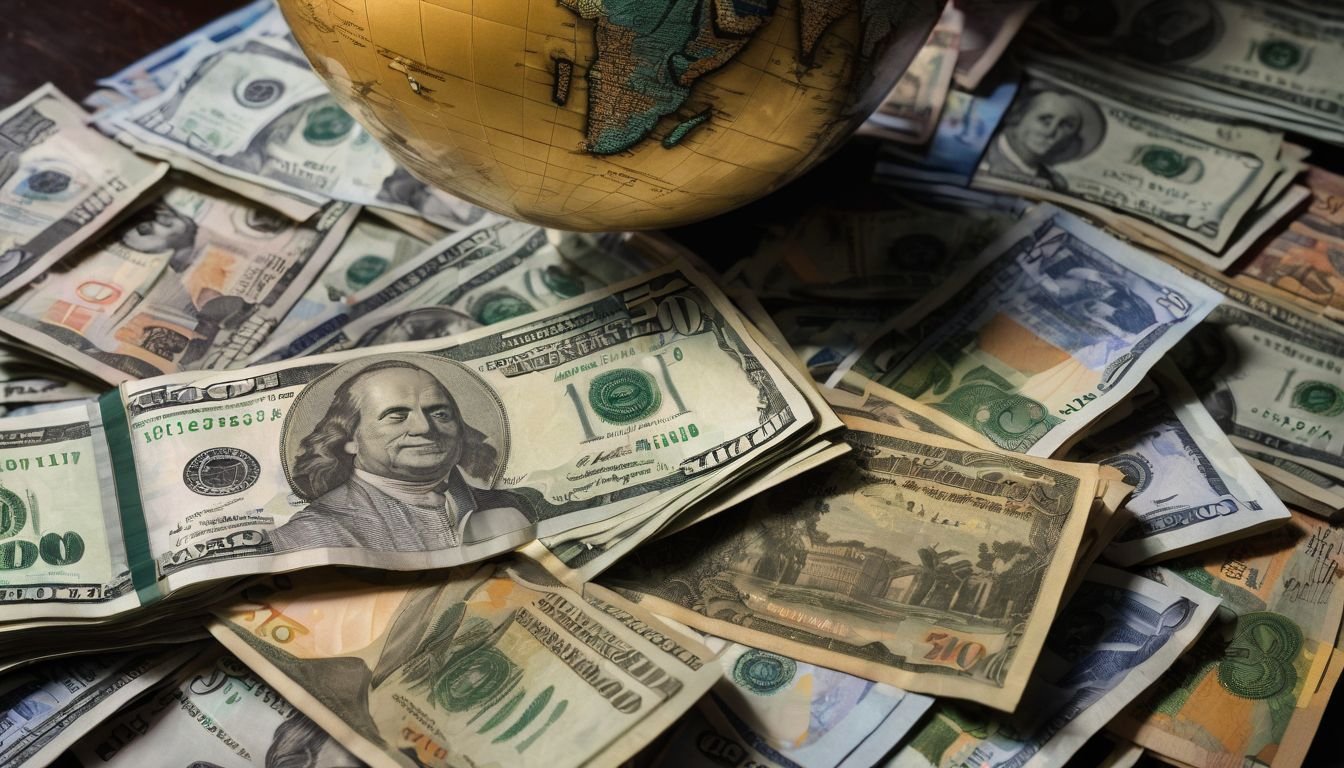How much cash should I carry in Bali?
OTT with the lamps, I know! Bali market meets dreamtime | Digital art by Simon
Table of Contents Show
How much cash should I bring to Indonesia?
I suggest a daily budget of:
$25 to $50 per day for budget travelers
$50 to $100 per day for mid-budget travelers
$150 per day for luxury travelers
However, you don’t need to carry this all in cash. You should carry 40–60% in cash, with the balance in a checking or savings bank account accessible with an ATM card. You could also consider carrying a credit card. This combination of cash, cash card and credit card will strike the perfect balance of lower fees, better exchange rates, and safety. I do not recommend using Travel Money Cards (they are a ripoff).
Want more detail on how much cash to bring to Bali?
Deciding how much cash to carry in Bali can be confusing, a doubt many travelers like myself often encounter. Based on 25 years of traveling experience and thorough research, I've figured out that careful planning can ease this dilemma.
This blog post will guide you through various factors, such as daily expenses and payment options, to help determine the ideal amount of cash you should have while in Bali. Intrigued? Let's dive into the details.
Key Takeaways
Research the average costs of daily expenses in Bali, including accommodation, food and drinks, transportation, and activities and attractions, to determine how much cash you'll need.
Evaluate your spending habits and consider planned expenses as well as potential emergencies when setting your cash budget.
Bring a combination of cash and credit cards for flexibility while traveling in Bali, as credit cards are reasonably widely accepted, but having local currency on hand is essential for most smaller vendors or places like markets and drivers that will not accept card payments.
Want the full story?
Read our MEGA article, Bali Travel Tips for a complete list of tips and resources.
Other articles:
Factors to Consider When Determining the Ideal Amount of Cash to Carry in Bali
When determining the ideal amount of cash to carry in Bali, it's important to consider factors such as daily expenses, payment options, and safety considerations.
Daily expenses
In Bali, everyday spending includes meals, transportation, tickets for sights, and minor shopping. It's common to spend around USD $20-$30 per day on cheap local meals and scooter rentals or even less if you stick to a particularly tight budget.
For an average restaurant meal or taxi ride in bustling areas like Kuta or Seminyak, costs may be higher. However, buying handmade crafts at local markets or savoring delicious street food requires cash payments in the Balinese currency - the Rupiah.
So having enough cash handy is essential, but avoid carrying excess cash to prevent loss or theft.
Payment options
When it comes to payment options in Bali, you have a few choices. Cash is widely accepted throughout the island, so it's always good to carry some local currency, which is called Rupiah.
You can easily exchange your dollars for Rupiah at money changers or banks in Bali. Additionally, credit cards are widely accepted at hotels, restaurants, and larger stores. It's a good idea to bring a backup card in case of emergencies or if you prefer using electronic payments.
The ATMs in Bali offer convenient cash withdrawals and are generally safe to use. Just make sure to check with your bank about any international withdrawal fees before your trip.
Safety considerations
Safety should always be a top priority when carrying cash in Bali. It is important to take precautions to protect yourself and your money. One safety consideration is to avoid carrying large amounts of cash with you at all times.
Instead, keep only the necessary amount for daily expenses and leave the rest locked securely in your hotel room or a safe deposit box. Additionally, be aware of your surroundings and avoid flaunting or displaying large sums of money in public.
It is also advisable to use ATMs located inside reputable banks or shopping malls rather than standalone machines on the street, as they are generally safer and less likely to have skimming devices attached.
Tips for Deciding the Right Amount of Cash to Bring
When deciding how much cash to bring to Bali, it is important to research the average costs of daily expenses, evaluate your own spending habits, consider emergency situations, and use a combination of cash and cards for flexibility.
Research the average costs
Here are some key expenses to consider:
Accommodation: Look up the average cost of hotels or rentals in the area you plan to stay. This will help you budget for your housing needs.
Food and drinks: Find out the average prices for meals at restaurants or street food stalls. Remember to factor in the cost of drinks as well.
Transportation: Research the cost of taxis, public transportation, or renting a scooter or car. Knowing this will help you allocate funds for getting around Bali.
Activities and attractions: Look into the entrance fees for popular attractions and activities such as temple visits, water sports, or spa treatments. This will allow you to budget accordingly.
Evaluate your spending habits
To determine the ideal amount of cash to carry in Bali, it's important to evaluate your spending habits. Consider how much money you typically spend on a daily basis and use that as a starting point for budgeting your trip.
Think about what activities and attractions you plan to do in Bali and estimate the costs associated with them. For example, if you enjoy dining out at nice restaurants or shopping for souvenirs, factor those expenses into your budget.
By evaluating your spending habits beforehand, you can ensure that you have enough cash on hand to cover all of your planned activities without overspending.
Additionally, take into account any unexpected expenses or emergencies that may arise during your trip. It's always wise to have some extra cash available just in case something unexpected happens. Plan ahead by setting aside a small portion of your budget specifically for emergency situations.
Remember, it's also helpful to bring a combination of cash and cards for flexibility. While credit cards are widely accepted in Bali, having some local currency on hand will be useful for smaller vendors or places that may not accept card payments.
Consider emergencies
In case of emergencies during your trip to Bali, it's important to have some cash on hand. While credit cards are widely accepted, there may be situations where you need immediate access to funds and cannot rely on electronic payment methods.
Having a small amount of cash can help cover unexpected expenses or provide assistance in emergency situations. It's always better to be prepared and have some extra cash with you just in case.
Use a combination of cash and cards for flexibility
I always recommend using a combination of cash and cards when traveling to Bali. This provides you with flexibility in your payment options. While credit cards are widely accepted, it's a good idea to have some local currency on hand for smaller purchases or places that may not accept cards.
Additionally, bringing both cash and cards ensures that you have backup options in case one method is not accepted or if there are any issues with ATMs. By having this combination, you can feel confident knowing that you're prepared for any situation during your trip to Bali.
Conclusion
In conclusion, determining the ideal amount of cash to carry in Bali requires careful consideration of daily expenses, payment options, and safety. By researching average costs, evaluating your spending habits, and preparing for emergencies, you can make an informed decision.
Remember to use a combination of cash and cards for flexibility during your trip. With these tips in mind, you'll be ready to enjoy your time in Bali without worrying about financial transactions.
FAQs
1. How much cash should I carry while traveling to Bali?
The amount of cash needed in Bali would depend upon your daily expenses, activities and the duration of your stay. Doing a rough budget is enough - you don’t have to overdo it, but add a contingency margin to cover your butt.
2. Can I use my credit card instead of paying with cash in Bali?
Yes, some places accept cards in Bali but having a certain amount of Rupiah (the currency in Bali), is essential because most local vendors only take cash payments.
3. Where can I exchange money into Balinese currency?
You should exchange money only at official money changers in Bali - my tip is only change at a money changer that has air-conditioning. That quickly rules out all the dodgy ones on the street, with their scam high rates to tempt you.
4. What's better - bringing dollars into Bali or carrying local currency?
Definitely bring your own home currency if it is one of the widely accepted ones (see our list above), otherwise bring US dollars, Never buy Indonesian Rupiah at home - it will be a rip.
5. How do I calculate my budget for a trip to Bali?
Consider factors like travel expenses, accommodation cost, food and beverage expense, shopping plans & other activities when calculating your travel budget for a trip to this island paradise. The add a margin for unexpected expenses.
6. What are some tips on handling cash during my stay in Bali?
Keep small denominations handy for local transactions, know the current exchange rate, and be aware of ATM availability around you; always prioritize personal security while managing cash.















